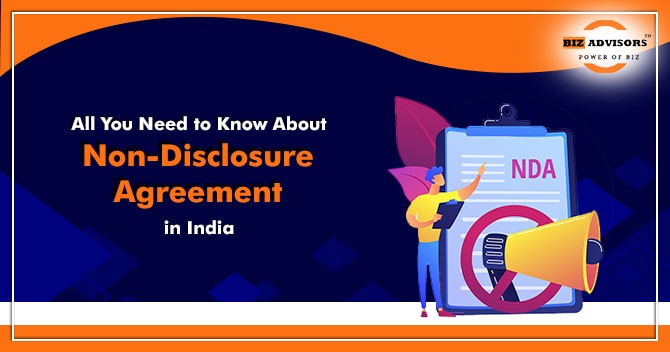A Non-Disclosure Agreement, also known as a ‘Confidentiality Agreement,’ is an agreement in which the parties agree to share the confidential information/data specified in the Non-Disclosure Agreement’s ‘Confidentiality Clause.’ The parties to the Non-Disclosure Agreement also agree not to disclose such information to a third party over the agreement’s terms. Nowadays, whether a company is a start-up or not, one of its most valuable assets is its intellectual property. A NDA aids in the protection of the parties’ Intellectual Property Rights, including databases, client lists, proprietary information, sensitive business-related information, and so on. Non-disclosure Agreement is also known as:
- Confidential Agreement (CA)
- Confidential Disclosure Agreement (CDA)
- Secrecy Agreement (SA)
- Proprietary Information Agreement (PIA)
Advantages of Non-Disclosure Agreement
- A Confidential Clause in the Non-Disclosure Agreement defines the ‘confidential matter’ for which the Non-Disclosure Agreement is entered into.
- It assists in maintaining the utmost confidentiality between the parties by legally binding them through various clauses constituted under the Non-Disclosure Agreement. The receiving party is then prohibited from disclosing confidential information.
- Various clauses of the Non-Disclosure Agreement also specify the time frame within which the party is required to keep the information secret. This period could extend beyond the NDA’s effective period.
- A Non-Disclosure Agreement is legally binding, and the party who violates it is legally obligated to compensate the aggrieved party (which is mostly the disclosing party).
- If the level of violation demands, the dispute can be referred to an arbitrator or even taken to court. As a result of their efforts to safeguard the shared confidential information through the Non-Disclosure Agreement, the owners of the confidential information are granted relief.
Precautions while Entering into a Non-Disclosure Agreement
- One must ensure that all confidential information shared or will be shared with the other party is clearly and unambiguously mentioned in the Non-Disclosure Agreement.
- Make certain that all parties to the agreement understand what they are signing. The parties’ obligations and rights under the Agreement must be known and understood.
- It is not advisable to include unfair clauses in the NDA, but prior analysis of the nature of the other party, also known as conducting Due Diligence, must be done, and necessary clauses must be inserted in the Agreement.
- The behavior displayed during the NDA can be an early indicator of how the entire negotiation process will unfold. While it is not advisable to include unfair clauses in the NDA, being too rigid creates a challenging environment.
- None of the clauses in the same Non-Disclosure Agreement shall be confusing or in conflict with each other, as this may confuse the parties. Since the parties’ confusion may also result in legal bills,
- If the parties to an agreement mutually agree to refer a dispute or breach of an agreement to an Arbitrator rather than a Court, both parties will save time and money.
More Information About NDA
- A Non-Disclosure Agreement (NDA) is governed by the Indian Contract Act of 1872[1], and it is a legally binding contract under it. It is recommended that the Agreement be stamped to ensure its continued validity and enforceability.
- It is not required to have an NDA printed on Stamp Paper. An NDA can be printed on company letterhead and signed by both parties on both sides of each page of the NDA. If you want to print the NDA on stamp paper, use non-judicial stamp paper or e-stamp paper (available in certain states). Sign the NDA in the presence of witnesses.
- Each state in India has a different stamp paper value. Thus, the value of Stamp Paper will be determined based on the state in which the agreement is executed. The value of Stamp Paper or the amount of Stamp Duty payable can be found on the websites of state governments.
- It is not required to nota rise or has the Non-Disclosure Agreement signed by a Witness. However, to ensure the Non-Disclosure Agreement’s continued validity and enforceability, parties may choose to have witnesses sign the NDA and enact the document’s validity so that it cannot be challenged in a court of law.
- For bringing a claim for breach of agreement in a court of law, an agreement with witnesses has a limitation period of 12 years, whereas an agreement without witnesses has a limitation period of 6 years.
- The limitation period is the legally specified period after which no legal action may be brought in a court of law. Registration of an NDA is not required under the Indian Contract Act, which governs the Non-Disclosure Agreement in India. However, registering an NDA makes it easier to prove the document’s validity and your case.
- The penalties for breach of the agreement are generally specified in the agreement itself, and the breaches or infringements are dealt with accordingly. If the penalty is not specified in any agreement, it is clearly stated that the person who violates or breaches the contract will be sued for such misappropriation.
- There is no time limit set for the duration of the NDA. In general, the Non-Disclosure Agreement is expected to last between 2 and 5 years. Corporates may also enter a Non-Terminating Non-Disclosure Agreement to protect their trade secrets permanently.
Conclusion
A Non-Disclosure Agreement is a contract in which the parties agree not to disclose any information covered by the agreement because agreeing creates a confidential relationship between the parties requiring them to protect all confidential and proprietary information that is not already in the public domain. NDAs are increasingly being used in India and are governed by the Indian Contract Act 1872; however, for NDAs to be valid in India, they must be stamped. NDAs are widely used because they are low-cost and simple to create legally binding documents. It is critical to be as detailed as possible when drafting the Agreement. Seek professional advice for Non-Disclosure Agreement. You can also reach at Bizadvisors.io.
Read our article:All You Need to Know about the No Objection Certificate
 9559179325
9559179325 9559179325
9559179325





